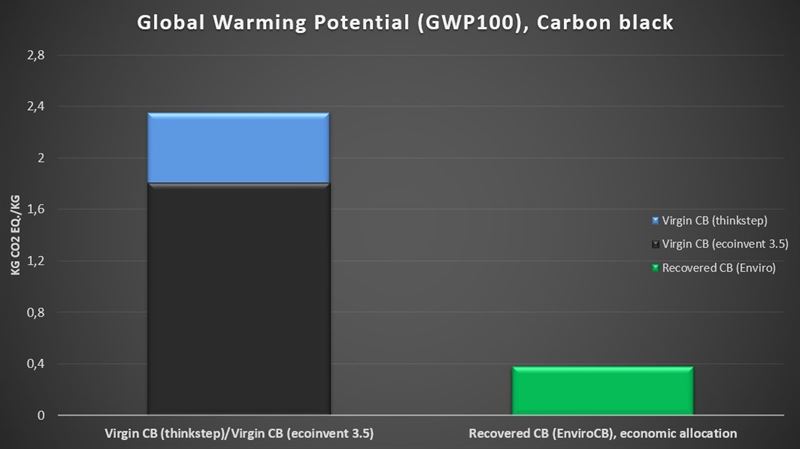Enviro’s rCB reduces CO2 emissions by over 79 %, better than earlier estimates
N.B. The English text is an in-house translation of the original Swedish text. Should there be any disparities between the Swedish and the English text, the Swedish text shall prevail.
Life-cycle analysis of recovered carbon black
Enviro’s recovered carbon black is demonstrably a good environmental choice, according to a new life-cycle analysis (LCA) from the IVL Swedish Environmental Research Institute. Recovered carbon black leads to CO2eq emissions that are 79-84 percent lower than the emissions from the production of virgin carbon black – a figure considerably better than earlier estimates of 60 percent.
“It's fantastic to learn what great environmental benefits Enviro's recovered carbon black can bring. The whole industry is looking for materials to reduce the impact on the climate, so this is very good news, both environmentally for the industry, and in terms of the economic potential for Enviro”, says Thomas Sörensson, Enviro CEO.

The diagram shows a comparison between virgin CB and Enviro’s rCB for CO2 emissions. Thinkstep and Ecoinvent 3.5 are two different global databases for LCA data linked to specific commodities, which in this case are both virgin CB rubber grade.
The IVL Swedish Environmental Research Institute, together with Enviro, has carried out a life-cycle analysis (LCA) of Enviro's recovered carbon black (rCB) EnviroCB, and the other materials that are extracted through the company's pyrolysis techniques: oil, steel and gas. The purpose of the analysis was to provide an overall picture of these materials' environmental impact, and the results show, among other things, that for each kilo of recovered carbon black that replaces virgin carbon black, total emissions are reduced by 1.43-2.00 kg of CO2.
“Enviro’s recovered carbon black provides the tyre, rubber and plastic industries with a fantastic opportunity to introduce a recyclable material that heavily reduces the worldwide environmental impact. The other recycled materials – oil, steel and gas – provide a further reduction in greenhouse gas emissions.”
One of the indexes used is Global Warming Potential, GWP, which makes it possible to compare the greenhouse effect for greenhouse gases at a joint scale with the greenhouse effect for carbon dioxide [see graph].
“If the 9,000 metric tonnes of recovered carbon black produced by one of Enviro’s plants in a year were to replace virgin carbon black, the resulting reduction in greenhouse gas emissions is 12,900-18,000 tonnes, which would correspond to more than 40,000 single-leg flights from Stockholm to New York (https://www.icao.int/environmental-protection/CarbonOffset/). In addition to this, we have emission reductions combined with recycled oil, gas and steel.”
More stringent environmental laws, producer responsibilities, and an ongoing worldwide shift to more sustainable production is leading to increased interest both in Enviro’s rCB, EnviroCB, the other recycled materials (oil, steel and gas), and the business of Enviro’s plant facilities.
“The carbon black market is expected to grow by about 8.8 percent annually in the coming years, and the demand for Enviro’s recycled materials will increase accordingly. These two driving forces are the basis for Enviro's changed business model, which involves partial ownership of future plant facilities, allowing us to better capitalise on the company's leading position.”
LCA is a method for identifying and measuring the total environmental impact during the life cycle of a given product, from raw material extraction, through manufacturing processes and use, and up to the waste management stage, including all transports and energy expenditures that occur in between. The LCA done by Enviro and the IVL Swedish Environmental Research Institute was carried out in accordance with ISO 14040/14044 for life cycle analysis.
For more information, please contact:
Thomas Sörensson, CEO Enviro, +46 (0)735-10 53 43, thomas.sorensson@envirosystems.se
Urban Folcker, CFO Enviro, +46 (0)760-00 13 11, urban.folcker@envirosystems.se
Mangold Fondkommission AB, +46 8 503 01 550, ca@mangold.se, is Enviro’s Certified Advisor at
Nasdaq First North Stockholm.
Scandinavian Enviro Systems AB
Regnbågsgatan 8C
SE-417 55 Gothenburg, Sweden
info@envirosystems.se
www.envirosystems.se
Scandinavian Enviro Systems AB (publ) is required to publish this information under the EU market abuse regulation. The information is provided by the contact person listed above for publication on March 21st, 2019, at 17.40 CET.
Enviro is a company developing, building and operating industrial plants for material recovery from End of Life Tyres (ELT). The company has developed a process, based on a patented technology, where gas generated in the process is heating the tyres in absence of oxygen. This enables the materials in the tyres to decompose and be recovered instead of incinerated. Thus, a sustainable recovery of the resources Carbon black, Oil, Steel and Gas is obtained. The products are used in new products, replacing fossil resources to help the customers reach their sustainability targets. Enviro was founded in 2001, has its head office in Gothenburg and runs its own plant for ELT tyres in Åsensbruk, Sweden. The company is listed on the Nasdaq First North securities exchange with Mangold Fondkommission AB, tel. +46 (0)8 5030 1550, ca@mangold.se, as its Certified Advisor. www.envirosystems.se


